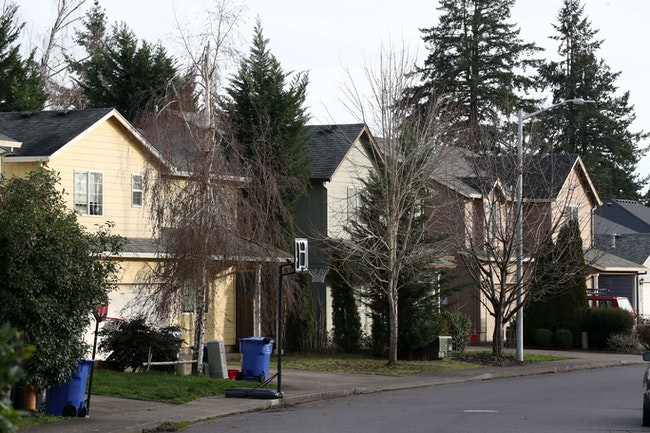Home values are skyrocketing across the Salem area, but most homeowners in Marion and Polk counties are seeing the same 3% property tax increase they’re used to.
As of Jan. 1, the real market value of all property in Marion County rose by 15.9% from last year to $57.66 billion. That growth is driven by new development as well as the increasing value of homes and residential land in cities and towns, the Marion County Assessor’s Office said in a news release.
Every year, the assessor’s offices in Marion and Polk counties determine properties’ real market value, which reflects the estimated amount of cash buyers could reasonably expect to pay owners for their property.
The real market value of all Marion County properties this year grew by over twice the rate it did last year, when it rose from 7.63% in 2020 to $57.2 billion.
Escalating values of homes and residential land in cities and towns have brought the total real market value for those properties to $32.32 billion, a 26.71% increase from 2021, according to the news release.
That rate is more than five times higher than the 4.89% increase in 2021.
Marion County Assessor Tom Rohlfing said he believes demand for residential properties “was really high because of just continuing historically low interest rates at the time.”
In Polk County, the real market value of all property grew 22% from 2021 to $15.6 billion, according to a news release. That’s compared to a 9% increase in 2021, which she said was roughly the same the previous year.
Polk County Assessor Valerie Patoine said the market in Polk County is impacted by the shortage over the past decade of new housing that’s available or being built.
“There are more buyers than there are homes for sale which is driving the increase of property values,” she said. “This along with low interest rates created a competitive marketplace and is contributing to the increased property values.”
Construction in Polk County has been significantly impacted by the increased cost of materials and labor, which have in turn been passed on to buyers, according to Patoine. She said interest rates and the high desirability of new construction has kept the market strong and fueled the rise in property value.
But due to Measure 50, a ballot initiative passed in 1997 that effectively limited increases in properties’ taxable value, the typical home that doesn’t undergo a physical or legal change will see no more than a 3% increase in taxable value. Larger changes are possible if a property was removed from a program such as an exemption, special assessment or court adjudication.
Measure 50 puts a cap on the assessed value of each property. A property’s assessed value is whichever is the lowest between the real market value and maximum assessed value.
Rohlfing said the average homeowner this year won’t see much of a change in their taxes.
The property owners with the most significant change, he said, will be those in areas impacted by local bonds and levies, as well as those who subdivide or otherwise change their property.
Rohlfing said the largest subdivisions this year were developed in Woodburn and Salem. “But I wouldn’t say that’s unusual for Marion County,” he said.
Rohlfing said the market value of mobile homes in Marion County has increased in recent years, which he said is driven by a demand for affordable housing.
Non-residential properties in Marion County also saw large jumps in value. Rural property, such as acreage homes, farms and forest lands continued to grow to a total real market value of $14.01 billion, a 16.85% increase from last year, the release said. The real market value of commercial and industrial properties has also steadily grown to $17.09 billion, a 6.9% increase from 2021.
Local K-12 schools, Chemeketa Community College and education service districts will get the biggest share of property tax revenue in Marion County at 45.91%. Cities will get 22.48%%, Marion County Government 17.24%, fire districts 6.57% and urban renewal districts about 3.37%.
Polk County property owners will typically see no more than a 3% increase in their assessed value, though tax rates may fluctuate due to local bonds and levies.
Under state law, property values are as of Jan. 1 each year. “It’s important to remember this when looking at your tax statement, almost a year later,” Patoine said.
The county’s overall assessed value grew by 4.5% to $7.41 billion, the release said, and the total amount of taxes, special assessments, fees and charges that will be collected for all districts in the county is around $116.4 million for the 2022 tax year, growing by 4.5% since last year.
In Polk County, Dallas has seen the most growth with the most new subdivisions platted, with Independence being a close second, she said.
Patoine said for the most part, there are no significant changes to tax rates in Polk County. The exceptions are the new Amity School District Bond, the new Southwest Polk Rural Fire Protection District Local Option levy, the Sheridan School District paid off their bond, and the Sheridan Rural Fire Protection District passed a new local option increasing their levy.
Over the past few years, she said there has been a low volume of calls and appeals made to her office.
“Due to the current strong housing market, we expect this year to be no different,” she said. “However we are always willing and ready to do a review for anyone that doesn’t agree with the value they see on their tax statement.”
Marion County mailed out tax bills Oct. 14, and they are due Nov. 15.
Polk County mailed out tax statements by Oct. 21. They are also due Nov. 15.
Both assessor’s offices encouraged property owners to review their tax statements for accuracy, and they can request a review before filing an appeal. The Marion County Assessor’s Office can be reached at 503-588-5144. The Polk County Assessor’s Office can be reached at 503-623-8391.
PRIOR COVERAGE:
Marion, Polk county homeowners see steady rise in property tax as values hit historic high
Tax bills on their way to Salem area property owners

Ardeshir Tabrizian has covered criminal justice and housing for Salem Reporter since September 2021. As an Oregon native, his award-winning watchdog journalism has traversed the state. He has done reporting for The Oregonian, Eugene Weekly and Malheur Enterprise.









